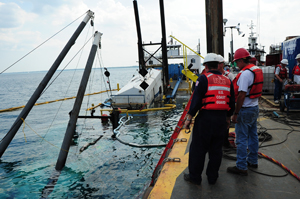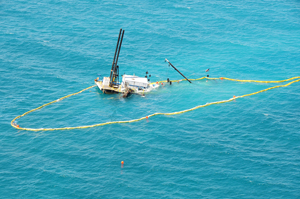A lack of watertight integrity likely caused engine-room flooding that sank a dredge and attached tugboat in Lake Huron, the U.S. Coast Guard said.
The 100-foot dredge Arthur J and 38-foot dredge tender Madison were victims of surprise heavy weather and higher-than-forecast seas July 19 two miles off Lakeport, Mich. The Coast Guard, which is still investigating, pointed to problems with the dredge’s seaworthiness for the conditions.
“We’re fairly confident that it was downflooding due to lack of watertight integrity on the decks and the design of the engine room and the access door into the engine room, which wasn’t watertight or weathertight and didn’t have adequate coaming to keep waves from downflooding the new engine room,” said the Coast Guard incident commander, Cmdr. Gary Koehler of Sector Detroit Prevention.
The vessels owned by MCM Marine Inc., of Sault Ste. Marie, Mich., were raised July 30 but not before 800 gallons of fuel were spilled.
MCM owner Joe McCoy said the vessels had completed a dredging project in Manistee, Mich., and were heading south for another project in Pointe Mouillee.
|
The 100-foot dredge barge Arthur J founders in Lake Huron, surrounded by containment boom, after encountering rough weather. A small tugboat, Madison, sank along with the dredge. Photos courtesy U.S. Coast Guard |
 |
|
Coast Guard and salvors aboard the barge Parker J discuss recovery operations for Arthur J and Madison. |
Two tenders were being towed on the hips of the dredge, which was being towed by the tugboat Drummond Islander II, Koehler said. Attached to one of the small work tugs was a small barge containing all of the dredging pipe.
Koehler said the initial favorable weather forecast had worsened after the vessels were underway and had taken the crew by surprise. “That does happen out there,” he said. The wave height of about 4 feet high created by a northeast wind “was more than that style of dredge configuration was designed for.
McCoy said, “It’s a 16-inch hydraulic dredge and they’re not normally towed in any kind of weather. The forecast changed on them and it’s hard to run from a storm when you can only make 4.5 to 5 knots.” He said he has operated the dredge and another of the same design built in the mid-1960s for two decades without a problem.
Koehler said when Arthur J swamped shortly before 0435, it carried Madison down with it.
McCoy immediately hired a pollution control contractor and salvage firm.
Initially the stern of the dredge had remained afloat because of trapped air. After the remaining fuel was removed, heavy weather came through and sank the entire vessel in 22 feet of water.
The contractor immediately plugged all the vents on the fuel tanks after up to 800 gallons of fuel had escaped from the vessels, Koehler said.
Much of the submerged oil and sheen on the water was contained within the boom and captured in absorbent material, he said. The remainder of unrecoverable diesel sheen dissipated through evaporation or heavy seas over several days.
The pumping out of the dredge fuel tanks recovered approximately 1,200 gallons of diesel and 35 gallons of hydraulic oil. Approximately 150 gallons of oily waste intact in drums and approximately 650 gallons of oily water waste mix were recovered during de-watering of Madison, Koehler said.
The fuel tanks were pumped out and the spuds removed. Then the dredge was refloated with compressed air pumped into the hull, lift bags and a crane on a salvage barge that lifted the 16-ton cutter assembly.
McCoy said the dredge and tender would be repaired and returned to service, but he did not have an estimate of the cost.

